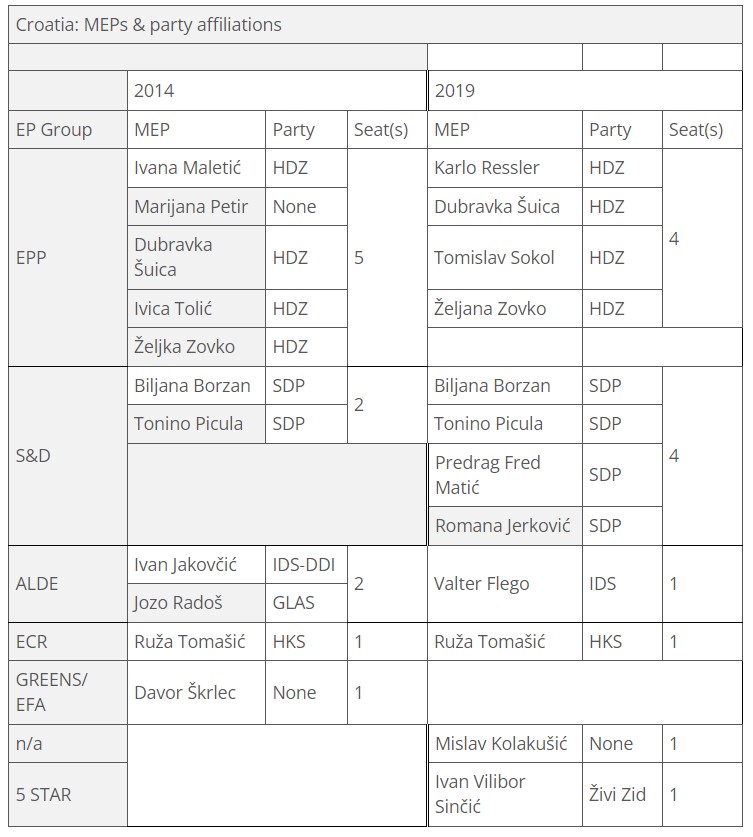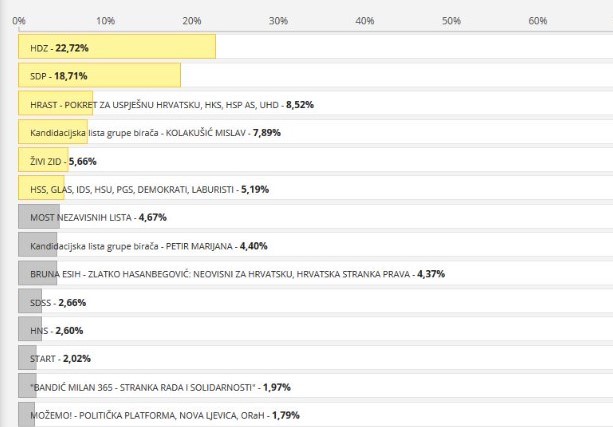The third euro parliamentary elections in Croatia brought many unexpected outcomes.
Contrary to the overall atmosphere during the election campaign, which many have characterised as anemic, impotent and utterly boring, the participation in this year´s elections increased almost by 5% and reached nearly 30% of the electorate (in 2014: 25,24%, 2013: 20,83%).
The ruling conservatives, Croatian Democratic Union (HDZ), led by Karlo Ressler – a political newcomer, former assistant of Prime Minister Andrej Plenković and the vice-president of EPP’s youth organisation – came out again as the strongest party by winning 22,72% of the vote. Their hopes to get 5 out of 12 total seats diluted only in the last moments of the ballot count, when HDZ lost a mandate to the second best Social Democratic Party of Croatia (SDP) – also a winner of 4 seats with the support of 18,71%. Nobody had expected such an outcome given that the party is still struggling to regain the voters’ confidence after the long-lasting internal leadership disputes.

In Croatia, members of the European Parliament are elected based on proportional representation and preference voting. On the ballot paper, a voter may mark one candidate whom she gives preference over the others on the same list. Preference votes for certain candidates count if the number of preference votes of a particular candidate is at least 10% of the votes given to the list. The candidate with the most preference votes moves then to the first place, while the line-up of other candidates remains the same. In such a way, the election results paint a more differentiated picture of party leadership structures and the strength of an individual politician.
The remaining MEP seats were equally distributed among four candidate lists. The third best score went to Croatian Sovereigntists, a clerical nationalist coalition of four parties which exactly proved that they are all worth next to nothing if it weren’t for incumbent MEP Ruža Tomašić (ECR), who gained 76,46% of the preference votes of the list. Mislav Kolakušić, a judge in Commercial Court in Zagreb, who independently ran for EP, obviously managed to pull the majority of protest votes based on the anti-corruption agenda advocating for law, order and justice. His success also came as a surprise for everyone, except for himself.

As for the votes from abroad, the highest turnout and the strongest support for ethno-nationalist political options traditionally came from Bosna and Herzegovina, where Consular offices of the Republic of Croatia opened 41 polling stations to make sure that each vote reaches the ballot box without too much of a trouble. On the other side, in Ireland whose labour market serves to buffer the excessive labour force – mainly of young people from Slavonija, an ever more depopulating eastern part of the country – majority of the support went to Živi Zid. Diaspora in Germany, Austria and Italy once again proved to be a stronghold of pro-ustasha, fascists (Neovisni za Hrvatsku) and clero-nationalists, while interestingly the majority (25%) in Denmark casted their vote to the debutant green-left coalition MOŽEMO! – Politička platforma, Nova Ljevica, ORaH.
Although the campaign lasted for 45 days, the most pressing social and economic issues have not made it to centre of political debates. Next to the poorest EU member state, Croatia suffers a great deal from various aspects of EU integration processes, most notably in the sphere of a labour market regulation and policies, but also through financial market pressures to open up social security systems, such as pension fund. The announced pension system reform that aims to liberalise the second pillar and rise the retiring age to 67 caused a lot of worry among older generations. Under the slogan “67 je previše” (67 is too much) an alliance of three union confederations (SSSH, NHS and MHS) started the referendum initiative in order to stop the reform. In spite of a catholic church ban to inform people and collect signatures in front of their doors, with the strong help of many volunteers, the unions managed to collect enough signatures and submit all necessary documentation for calling for the referendum. Three decades long process of deindustrialization combined with no-restrictions to the free movement of Croatian labour force resulted in the fact that hundreds of thousands working people left the country in a search for a better quality jobs and good working conditions.
Only two weeks before the elections, the Commercial Court in Pula has reach the verdict for Uljanik, in majority state-owned shipyard and one of the pillars of the Croatian shipbuilding industry. After eight months of not paying off the wages and the Government’s decision to reject to issue guaranties for loans and advances, the court has declared default of the umbrella shipbuilding company that gathers eleven spinoffs, by which 1118 workers and as many families were permanently left without bread on the table. Tourism is the only sector that fills in the state revenues, but on the other side it is the main driver of housing collapse in Zagreb and along the coastline and as well as of precarious working conditions in the industry.
Completely different sets of problems appear when we take look at the rising activities of a far-right political and clerical civil society actors, most of which could be scored under two main thematic lines: the first is defense of the homeland from “Yugo-comunists”, “Serbo-chetniks”, migrants and other enemies and occupiers by means of excessive use of all forms of hatred speech and the second is militant attack on abortion rights and fight against the looming evil of recently ratified Istanbul convention. This move of the HDZ’s government was seen as an ultimate act of treason. This is why Željka Markić, the icon of a rising clerical civil society movement, warned Croatian God-fearing electorate that, “Plenković mustn’t win 5 seats. In case he does, he will consolidate party leadership that will drag Croatia on the road of German and British democracies rather than on those of Hungary and Poland”.
In order ensure that the message is clearly understood, on Saturday 25th of May, and in the middle of the election silence, she organized Walk for life (family and nation) in three major cities in hoping to direct voters preferences away from HDZ. Paradoxically, on the same day, the turnout in these anti-abortion gatherings was double the smaller compared to the traditional manifestation of celebrating Tito’s birthday (The Youth Day) in his hometown of Kumrovec.
CAMPAIGN ISSUES AND THE LEFT-WING PARTIES
Some of the mentioned problems were put in the EU context and addressed by progressive and left-wing parties, but unfortunately without any wider popular resonance or palpable political gains.
A green-left political alliance Možemo! – politička platforma, Nova Ljevica, ORaH (We can! – political platform, New Left, Sustainable Development Croatia) selected two main topics for their electrion campaign: the affordable housing and ecological transformation following the Green New Deal. Their ground research in the field of housing shows that Croatia is the “champion” of the EU by the fact that more than 88 % of young people up to 29 years live with their parents while at the same time dispose of only 2% of the social housing fund, which is seven times less than the EU average. The coalition also actively took part in collecting the signature for ECI initiative Europeans for affordable housing – Housing for all.
In thanking Yanis Varoufakis and European spring for support, the leader of the list and Zagreb city councilor Tomislav Tomašević asserted “Croatia needs Green New Deal as much as Europe does. We need an ambitious state investment plan which will transform our economy towards 100% renewable energy sources and which will at the same time create sustainable and secure jobs while seizing austerity measures”. After intensive campaign that involved combination of field work with creative political interventions, the alliance managed to win 19.313 votes (1.79%).
Radnička Fronta (Labour Front) and Socijalistička Radnička Partija (Socialist Workers Party) focused their campaign on shipbuilding industry, which was the topic they have been actively engaged into since the 2018, when the determining crisis hit the sector. In their joint programme for the EP elections, they offered the list of their stances through which they firmly oppose to the neoliberal EU and all its’ institutional structures which reproduce the centre-periphery social and economic divergence, manifested in the rise social inequalities and worsening of working conditions for the latter. Their campaign messages did not find much space in the mainstream media. With a modest financial resources, they relied on the social media as the main channel of political communication with their voters. However, the credibility to speak in the name of the working class was impaired with relatively hermetic narrative, more suitable for the internal leftist debates than for persuading the working class to cast their vote for them. RF and SRP won only 2.645 votes and 0,24%.
The most provoking campaign was the one of the Serbian minority party led by a progressive, left-liberal Milorad Pupovac, the politician who’s known and appreciated for many anti-nationalist political moves and decisions (eg. his pro-Yugoslav positions at the beginning of 90’s, which were at the same time in stark contrast with those ethno-nationionalist of both, Milošević and Tuđman. Samostalna demokratska srpska stranka – SDSS (Independent Democratic Serb Party) decided to use the opportunity of European election campaign to bring to the fore the problems and difficulties of minorities status in Croatia. One simple question – Do you know what it’s like to be a Serb in Croatia? – provoked staggering rage of the right wingers who vandalized every single SDSS’s billboard across the country, with the standard repertoire of hatred messages (all sorts of calls raging from eviction to extinction of Serbian minority). Luckily, the campaign did not provoke the hatred only. Many felt compassion and some even boldly decided to join the campaign by reinstating the main message – that Croatia is and should be the state of equals. For instance, former President of Croatia (2000-2010) Stjepan Mesić pointed out to the cooperative role of the Serbian National Council, led by Pupovac, in complying with the EU accession chapter 24, which regulates the issues of Justice, freedom and security. With this campaign SDDS won the support of 2,66% of the electorate and brought the party to the tenth place (out of total 33 candidate lists).
We recommend: Katarina Peović, Croatia’s Political and Economic Situation – The Periphery of Europe Today



